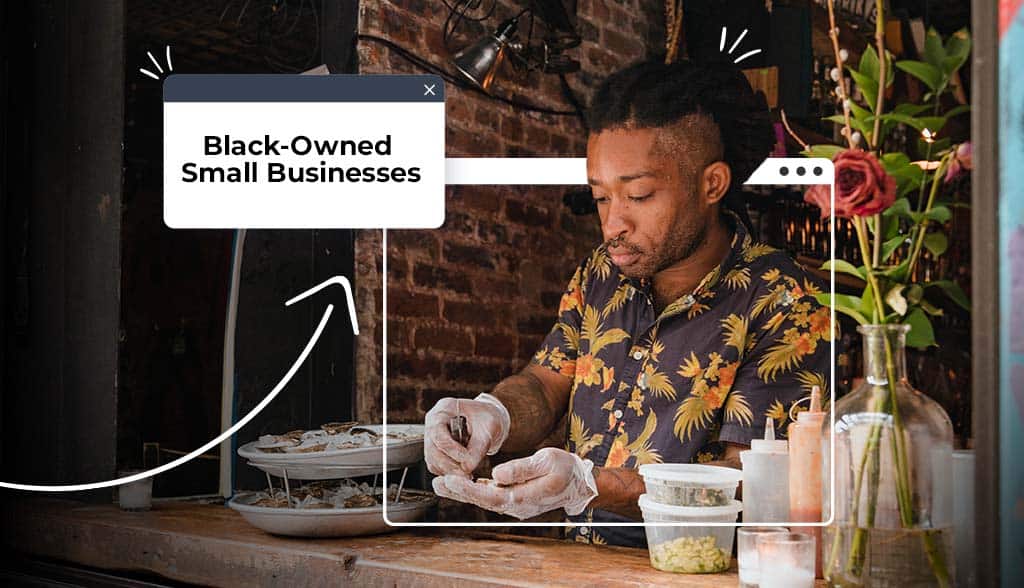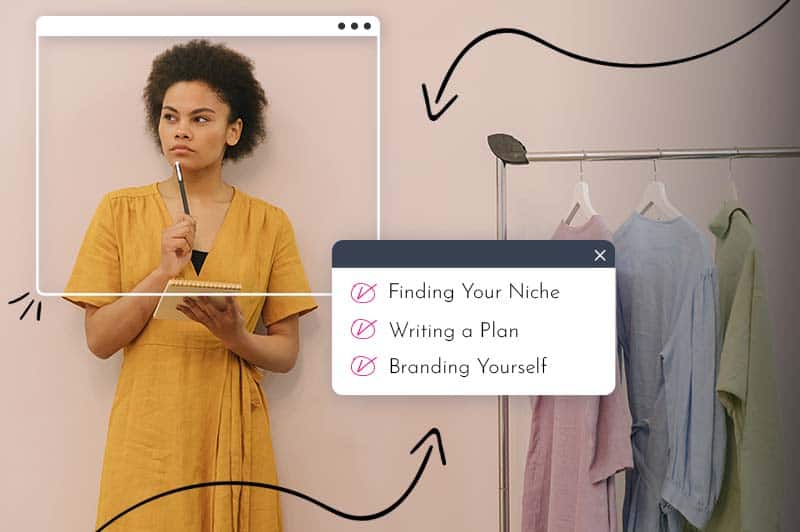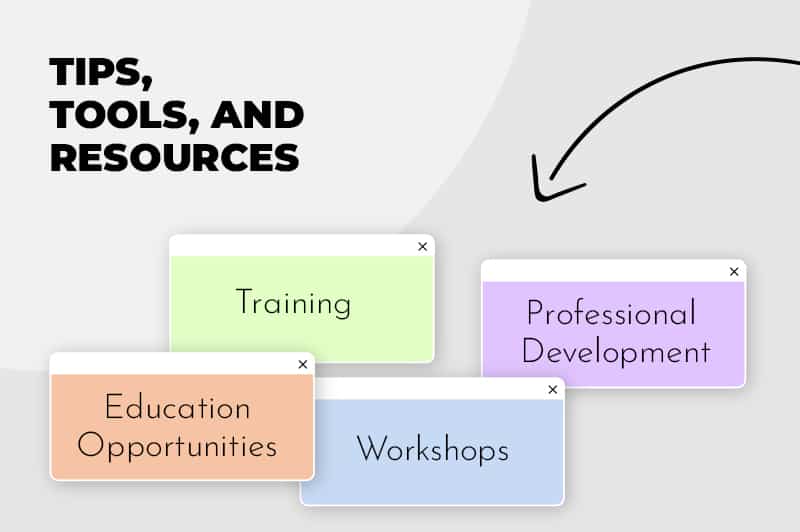
Having a small business comes with challenges — but when you’re a person of color, those challenges are amplified. That said, the rewards are equally as rewarding.
We want Black-owned small businesses to flourish, so we’re giving you the tools and resources you need to do so. This guide provides Black SMB owners the information needed for your business to thrive and grow.
Getting started is usually the hardest part. Where do you start? While you have the idea and the drive, it’s time to take it to the next level. And we’re going to point you in the right direction.

Anyone can have an idea. But a good idea is when it can cater to a specific group of people – that’s the first step for a successful business.
Picking a niche means tailoring your product or service to a small and specific audience. Sure, you want everyone to purchase your product or service, and while it may seem like a good idea, that’ll only level you running in circles.
It’s more advantageous to focus on a targeted group. There are many ways to go about this. For Black-owned small businesses, in particular, you can choose to target a couple of different subgroups. For example, if you are planning to start a dog grooming business, you could specialize in toy dogs or mobile grooming. If your business is location-specific, you could target your locale — while also marketing to those who are looking to support Black-owned businesses.
Regards of the type of small business you have, there are key aspects to finding your niche, including:
As a Black business owner, you are already unique. Among the about 32.5 million businesses in the United States, most of those are classified as small businesses. Just about 1.1 million of those businesses are minority-owned — and only around 134,567 are Black-owned. 99.9% of those Black-owned businesses are also considered small — but they are doing great things for their respective communities in the healthcare and social service space.
The most successful businesses have a plan at some point. Even if it’s just a one-page business plan — getting your ideas, goals, and milestones down in a tangible format gives you something to refer to along the way.
Much of your business plan will include data you’ve already gathered when nailing down your niche. Make sure to identify:
Notice that you need to identify a unique quality your small business has? This may sound a little daunting, but it doesn’t have to make you better than the competition — just different.
Ask yourself what you can offer to your ideal client that would lead them to choose your business over other, similar businesses. Most times, advocating for Black-owned businesses and/or the Black community, as a whole, serves this purpose.
Your business plan doesn’t have to be set in stone. As long as you take the time to draw one up, you’re ready and able to begin working toward your goals. If those goals even change along the way, that’s growth.
Similar to the ebbs and flows of a business plan, you’re allowed to change up your branding every once and a while. However, staying recognizable to your customers is of utmost importance.
For that reason, your name and your logo are two of the most important elements of your business, so take time to think about it. When branding your business, here are the basics you need:
If you need inspiration, try looking at similar businesses and taking note of their branding. Check out the logos of similar companies in your field. Notice what colors and images they use and how this resonates with their audience.
Keep tabs on what organizations they are affiliated with and how they highlight this on their websites — particularly those with founders of color.
To run any business, you have to complete a few formalities. In your case, you’ll have to at least establish your business structure.

A freelance business requires less legwork to get started. If you’re just testing out your small business idea, this is a good way to start.
Just keep in mind, freelance income must be reported in a 1099 form to the IRS — and you will likely owe personal and self-employment taxes at the end of the year. This is known as a sole proprietorship — or partnership for two people — that doesn’t need to be officially incorporated.
Some people continue freelancing for the entirety of their business life. However, if you want to expand, your best bet is to become incorporated as an official small business.
Starting a small business comes with a few more hoops to jump through, but they come with perks like the ability to hire employees and limited personal liability if something goes awry with your business financially. This comes with some seemingly daunting options. The right option becomes clearer though, once you learn the terms for the most common business structures:
There are other options, but these are the most common that you will come across when incorporating your small business.
Regardless of the type of corporation you choose, you will need an employer identification number (EIN) — even if you don’t intend on having employees for a long time, or even ever. An EIN is a taxpayer identification number for businesses, and you need it when you hire someone, pay taxes, or even sign up for certain business organizations.

Minority-owned businesses have a secret advantage in that they know the importance of identity. You know the meaning of community, the definition of oppression, and the value of overcoming hardship.
You have a unique perspective that allows you to dig deep and maintain a solid vision for your brand. This will translate to your clients, and your business will thrive off of it (but it needs to be nurtured).
At the heart of Black-business branding is storytelling. As a person of color, you may choose to embrace your story. Translating that to branding and marketing, however, is a bit trickier.
You have to make it clear enough to make sense quickly, as consumer media attention spans are getting shorter and shorter. Then, you have to make it impactful enough to evoke emotion and invoke behavior. This is important to:
Keep in mind that you don’t have to entirely cater to Black consumers! This is your choice. You may still — and are encouraged to — harness your Black voice and identity to empower yourself and your business.
Even if your brand intends to be “race-neutral,” you can still acknowledge that you don’t have the same privileged outlook as the majority of other business owners out there.
Regardless of what your ideal clientele looks like, your customers all have something in common — your business. Draw from that commonality and start a conversation around relevant topics. Use the following marketing channels to your advantage:
Each of these channels has its intricacies and will require further research. Some general guidelines for each are to use the following to your advantage:
The work you are doing to build up your business as a person of color has a snowball effect. It permeates each marketing effort, and it gets people talking. Keep going.

However well society thinks it’s doing with inclusivity, there is still an innate stigmatization of minorities. This, unsurprisingly, extends to business owners. Black entrepreneurs are seeing more success than ever, but they are still faced with many of the same hurdles as always — coupled with new challenges that pop up as society attempts to change its tune. Many Black business owners turned to ownership to avoid these stereotypical challenges, but racism rears its ugly head in insidious ways.
There are positive and important initiative like ‘black history month‘ that can contribute to better education about innate racial biases and the history of black people in America, but these initiatives still only go to show how much further we have to go.
It’s hardly a revelation that humans have innate racial biases — regardless of social justice strides or performative activism, contrary to popular belief. While some states in the U.S. are less overtly racist, according to a Harvard project, implicit biases exist in all areas. White citizens tend to associate “familiar”, similar features with positive words, and negative connotations with those “unfamiliar”, dissimilar to them.
This leaves minorities in a tough position where they must seem grateful for strides against stereotypes, yet still on guard for those biases that they are still acutely aware exist all around them. For Black-owned businesses, this could be the deciding factor in the battle to sink or float.
It’s hard to ignore the racial gap in business ownership. There is a disparity between Black Americans employed and Black business owners — so much so that the country is losing out on about $300 million in profits and the creation of nine million jobs. This clearly shows the greater need of society to continue “business as usual” than to create opportunity and wealth for those in need.
For those Black entrepreneurs that do break the mold and start a business, it’s then difficult to secure funding. An average of one in 10 grant applications is accepted. This, however, doesn’t account for minority business owners that have more barriers to access grant-writing courses, grant subscription sites, and other financing resources.
What’s more, Black communities are historically associated with lower household incomes — leading to a higher tendency for Black individuals to be plagued by bad credit and, thus, facing higher interest rates on loans.
Even when controlling for creditworthiness, the disparity between interest rates for white business owners and Black business owners remains. Banks also frequently subject clients of color to closer inspection upon a business loan application.
Black business owners often have limited access to grant-writing courses, but the education issue runs much deeper than that. It starts early, with fewer Black Americans earning a high school diploma and going on to get a college degree. While the numbers are on the rise, Black citizens have had to work exceptionally hard to come close to reaping the educational benefits of their white counterparts.
Publications will brag that there are more Black individuals than ever obtaining higher education. This makes the United States look progressive and on the up and up. Again, though, it doesn’t account for the hoops that the Black community has to jump through to make this happen.
While these statistics are stark and can be discouraging, there is a light at the end of the tunnel. Rather than having success handed to you, you have worked hard for your place in the business world. You know the worth of each dollar you bring in, and you are well-equipped to handle any obstacle that comes your way.
Here are a few tips to remember throughout your journey as a Black business owner facing inevitable racism and obstacles:
Although the numbers are disconcerting, Black-owned businesses are succeeding in all the right ways — and for good reason. The sense of community allows Black entrepreneurs to rally and rise to the occasion. This means that there are more and more groups and organizations to turn to to get assistance for your new Black-owned business.
Finding organizations that build you and your Black-owned business up is crucial to your brand identity and success.
It not only helps your morale and education, but it gives you access to a host of networking opportunities. Some of the more prolific associations for the betterment of Black-owned small- and medium-sized businesses include:
Many of these organizations come with membership perks and resources. Some of the non-government organizations offer networking and marketing to a like-minded audience via free or paid directory listings. For each organization you join, check out the badges and affiliations you can place on your website. Also watch for funding, education, and training opportunities exclusive to each organization.

While most of the organizations offer internal opportunities, it’s still worth it to do your research on all the Black-owned business education and training available to you. The best businesses, in general, are constantly learning. Some sites for professional development of minority-owned businesses and beyond include:
Also check your business area for any local education opportunities, such as Capitol Pathways of Minnesota or the Small Business Empowerment Program of Portland, Oregon.
Although Black-owned businesses receive less funding, there are niche funders that are willing and able to help. Many grant-search sites are behind a paywall, but there are funding organizations that are dedicated to helping Black-owned businesses thrive and procure funding more simply.
Some places to start looking for funding for your minority-owned small business include the following seed investors, venture capitalists, grant opportunities, and funding foundations:
You may notice the connection of Black- and women-owned businesses in some of the above resources. If you are a Black woman starting a small business, pay attention to these organizations catered toward helping kickstart your dreams.
All of the resources listed above are a solid jumping-off point for your Black-owned business. However, remember that new support groups are emerging constantly.
Check your local chapters of organizations, scour Facebook groups, and talk to like-minded individuals about funding opportunities. Above all, don’t give up — your perseverance is the ticket to your Black-owned business success.